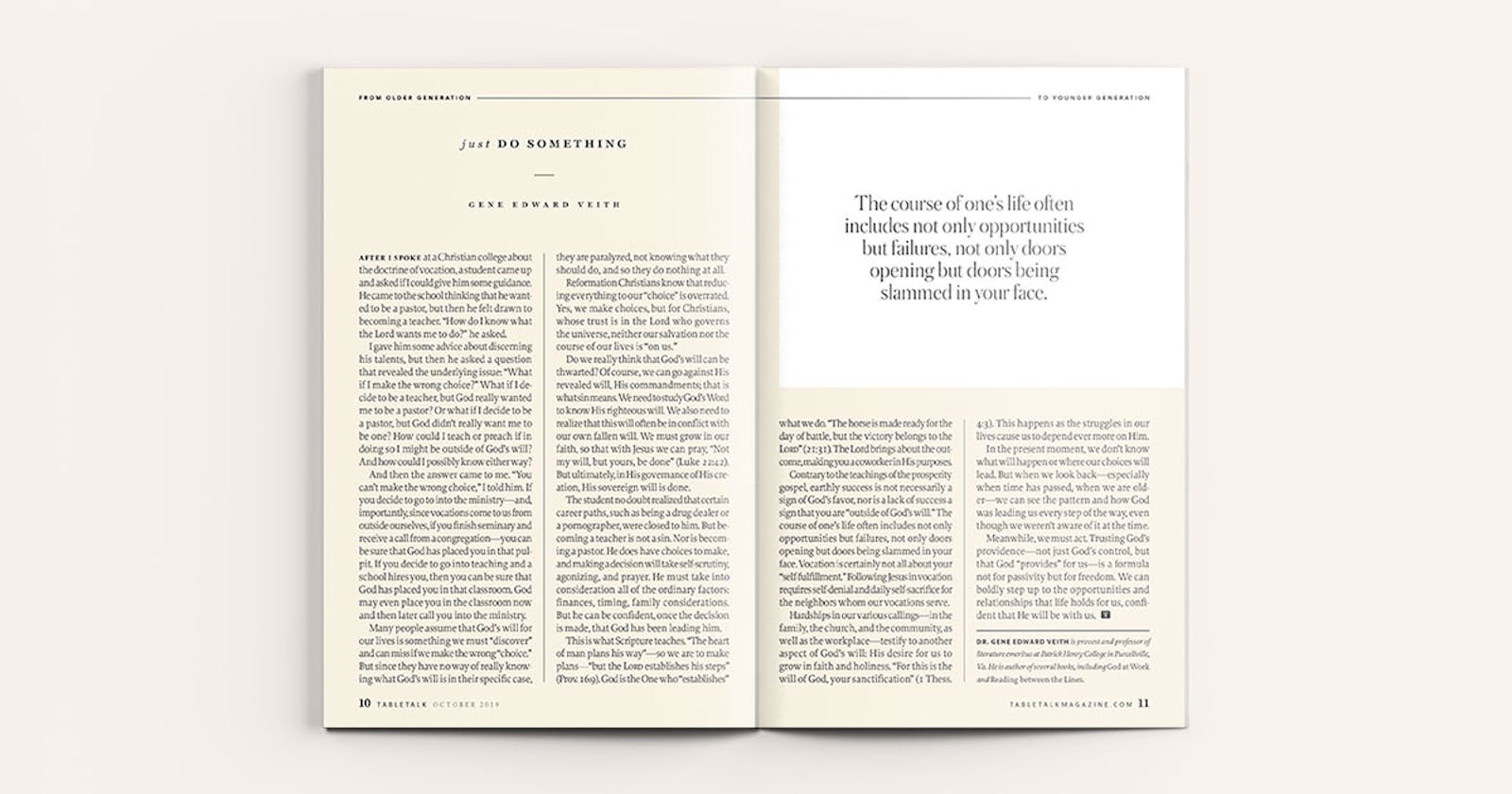
Request your free, three-month trial to Tabletalk magazine. You’ll receive the print issue monthly and gain immediate digital access to decades of archives. This trial is risk-free. No credit card required.
Try Tabletalk NowAlready receive Tabletalk magazine every month?
Verify your email address to gain unlimited access.
After I spoke at a Christian college about the doctrine of vocation, a student came up and asked if I could give him some guidance. He came to the school thinking that he wanted to be a pastor, but then he felt drawn to becoming a teacher. “How do I know what the Lord wants me to do?” he asked.
I gave him some advice about discerning his talents, but then he asked a question that revealed the underlying issue: “What if I make the wrong choice?” What if I decide to be a teacher, but God really wanted me to be a pastor? Or what if I decide to be a pastor, but God didn’t really want me to be one? How could I teach or preach if in doing so I might be outside of God’s will? And how could I possibly know either way?
And then the answer came to me. “You can’t make the wrong choice,” I told him. If you decide to go to into the ministry—and, importantly, since vocations come to us from outside ourselves, if you finish seminary and receive a call from a congregation—you can be sure that God has placed you in that pulpit. If you decide to go into teaching and a school hires you, then you can be sure that God has placed you in that classroom. God may even place you in the classroom now and then later call you into the ministry.
Many people assume that God’s will for our lives is something we must “discover” and can miss if we make the wrong “choice.” But since they have no way of really knowing what God’s will is in their specific case, they are paralyzed, not knowing what they should do, and so they do nothing at all.
Reformation Christians know that reducing everything to our “choice” is overrated. Yes, we make choices, but for Christians, whose trust is in the Lord who governs the universe, neither our salvation nor the course of our lives is “on us.”
Do we really think that God’s will can be thwarted? Of course, we can go against His revealed will, His commandments; that is what sin means. We need to study God’s Word to know His righteous will. We also need to realize that this will often be in conflict with our own fallen will. We must grow in our faith, so that with Jesus we can pray, “Not my will, but yours, be done” (Luke 22:42). But ultimately, in His governance of His creation, His sovereign will is done.
The student no doubt realized that certain career paths, such as being a drug dealer or a pornographer, were closed to him. But becoming a teacher is not a sin. Nor is becoming a pastor. He does have choices to make, and making a decision will take self-scrutiny, agonizing, and prayer. He must take into consideration all of the ordinary factors: finances, timing, family considerations. But he can be confident, once the decision is made, that God has been leading him.

This is what Scripture teaches. “The heart of man plans his way”—so we are to make plans—“but the LORD establishes his steps” (Prov. 16:9). God is the One who “establishes” what we do. “The horse is made ready for the day of battle, but the victory belongs to the LORD” (21:31). The Lord brings about the outcome, making you a coworker in His purposes.
Contrary to the teachings of the prosperity gospel, earthly success is not necessarily a sign of God’s favor, nor is a lack of success a sign that you are “outside of God’s will.” The course of one’s life often includes not only opportunities but failures, not only doors opening but doors being slammed in your face. Vocation is certainly not all about your “self-fulfillment.” Following Jesus in vocation requires self-denial and daily self-sacrifice for the neighbors whom our vocations serve.
Hardships in our various callings—in the family, the church, and the community, as well as the workplace—testify to another aspect of God’s will: His desire for us to grow in faith and holiness. “For this is the will of God, your sanctification” (1 Thess. 4:3). This happens as the struggles in our lives cause us to depend ever more on Him.
In the present moment, we don’t know what will happen or where our choices will lead. But when we look back—especially when time has passed, when we are older—we can see the pattern and how God was leading us every step of the way, even though we weren’t aware of it at the time.
Meanwhile, we must act. Trusting God’s providence—not just God’s control, but that God “provides” for us—is a formula not for passivity but for freedom. We can boldly step up to the opportunities and relationships that life holds for us, confident that He will be with us.
